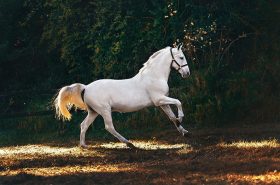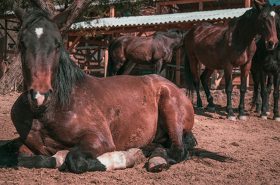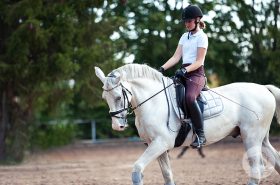Are you trying to get the most out of your limited weekly riding times, stretch your dollar further, and have fun socially? Have you stayed in private lessons assuming undivided attention from your instructor will improve your skills quicker? Have you thought about incorporating a different approach to your training program?
Consider revamping your training regimen, because there are many benefits to riding in group lessons. Group lessons offer so much more than what riders or parents give it credit for. Riders should talk with their instructor and assess their best action plan since everyone has different goals. Students benefit the most when individualized training plans are customized to meet the targeted goals.
There are many benefits to group lessons. Since riders receive a longer ride time duration it becomes effective in helping students learn new skills. It is cost-effective, has more ride time, and creates comradery with others. During group lessons, riders can model others and learn from the instructor, learn from others in the class, and riders can use imagery techniques to help when they are not riding.
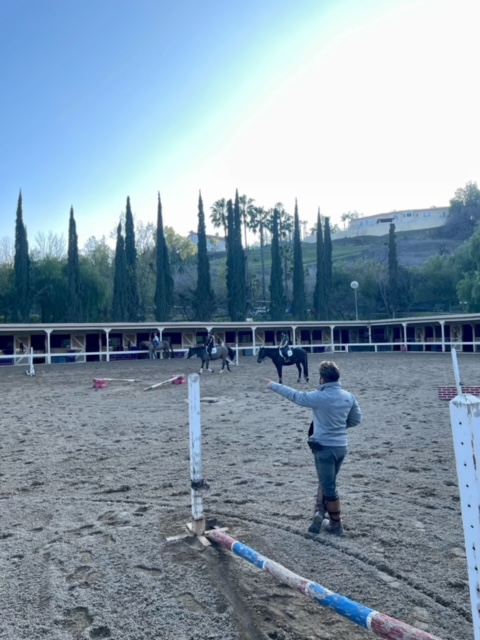
Because group lessons have decreased individualized instruction time, an added benefit is group lessons allow riders to develop independent riding skills. At a very beginner level, it is crucial for the safety of the students that attention is focused on riders constantly. However, as riders develop their skills, it becomes beneficial for their riding development to solve situations independently. Suppose a rider aspires to be trusted by their trainer to go on trail rides with friends. Suppose that rider wants to trail ride on a horse, which the student may not legally own, causing additional financial considerations in case of an accident. Students must carry the confidence and have the skills to take care of themselves and horses when difficult situations occur.
Parents should allow students to take part in horsemanship classes at their stables or seek them out, allow students to stay involved in the riding and caring process of the horses, and be allowed to make mistakes without their helicopter parents hovering; around them or instructor having to constantly babysit them! Allow riders to learn for themselves all aspects of horses and not just climb aboard, and allow learning to occur at each student’s pace.
Another example of the importance of independent riding skills can be found when a rider competes at a show. When on the course, the student must make decisions to modify their ride and improve their performance. The rider must independently problem solve quickly and should have the confidence to believe their decision will be beneficial. Allowing the student to develop autonomy is validating and confidence-building for the rider. When the student becomes challenged, they have developed the skills needed to face the difficulty confidently. The coach can’t fix everything!
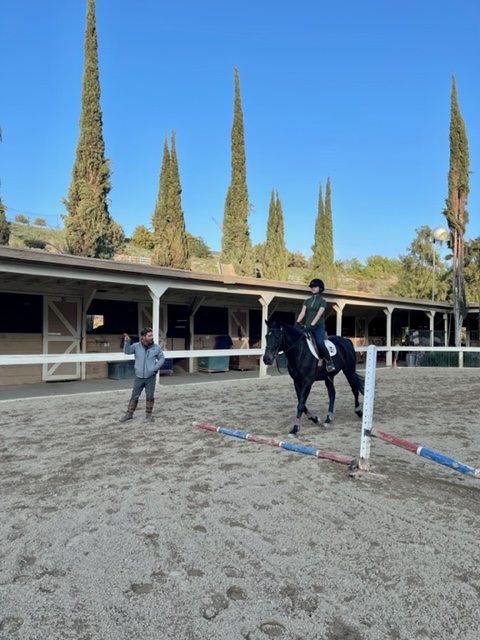
Riders must learn to ride with others while in group lessons, so students will learn to take responsibility for themselves, their behaviors, and emotions while riding. Students will begin to take on a new perspective when they discover their choices affect not only their horse and themselves but others and others’ horses, too. A great example is a rider who is unaware they pass another rider too close and upsetting the other rider’s horse. Everyone has accidentally done this, but quick learners navigate better the next time passing riders. Especially when their horse shows annoyance because they don’t want to become a dirt dart!
An example of the importance of a rider staying focused can be found with sweet little Suzy. Suzy has difficulty controlling her horse’s speed in her group lesson because her horse wants to trot quicker to keep up; with his friend! If little Suzy doesn’t want Pookie Bear trotting thirty miles an hour, she needs to stay present and aware of her horse’s speed, quit chopping off her corners, and shorten her reins! Although challenging for students to learn (and nerve-wracking to watch!), it is crucial as this can lead to problems with other horses during lessons. However, without learning during the early stages, how else will little Suzy learn skills needed to function in her future during a horseshow amongst a large class if they are not allowed to begin with the small mistakes in a controlled environment?
Group lessons are an excellent way for students to sharpen their focus and concentration skills during their ride, specifically their horse. Group lessons facilitate riders’ awareness of their horses’ behaviors because often, horses may behave differently amongst other horses versus in the arena solo during a private lesson. Suddenly students become aware of possible distractions while riding because subtle changes were noticed in their horses’ behaviors during groups, which the rider never saw before during private lessons. For example, the elusive pony who doesn’t want to leave the rail to circle because he wants to play follow the leader on the rail instead!
Mixing group lessons to your current training program of all privates has many benefits and is worth considering. Adding a group lesson more frequently can improve a rider’s skills and confidence. Group lessons are a great way to receive increased riding time, stretch your dollars further, and have fun learning with others.
Do you incorporate group lessons regularly in your training program? If so, what skills and improvements in your riding have you noticed?
Love this blog post? We think you will like Why Horses Are Good for Children

